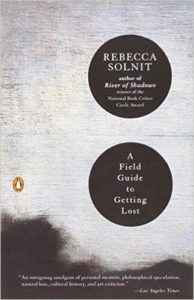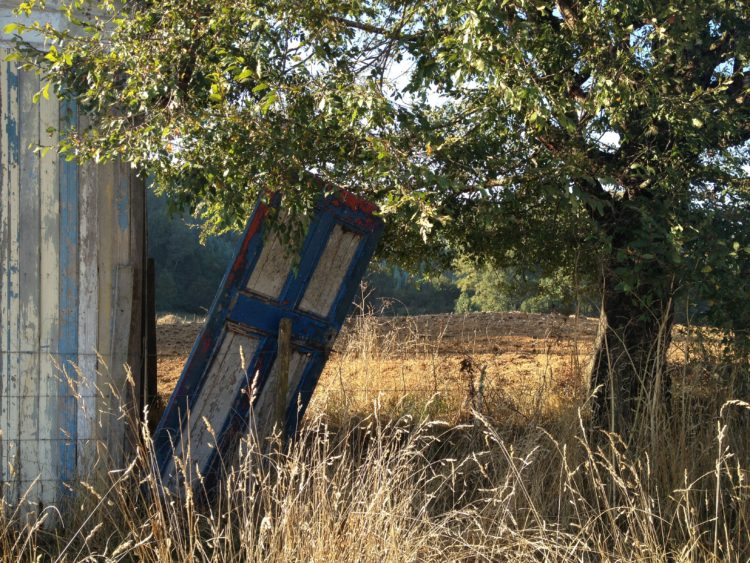Dear Friends,
I survived High School Spanish! Some days were way harder than others. Wednesday, I kicked two kids out of class. Yep. That’s right. Kicked. Them. Out.
Why, you ask? Let me tell you …
CELL-PHONES
I have concluded that cell-phones are from the devil. The. DEVIL.
Since when is it okay to text and write friends on your phones when you are in class?
Since never.
I begged, asked, pleaded, supplicated, and petitioned for students to get off their phones. To no avail. Finally, I started kicking them out. (Until they could conjugate two verbs.) That seems to have worked. For goodness’ sake. We really need a new ethics book on contemporary culture. In that ethics book we need an entire chapter on phone usage.
****
Besides teaching Spanish and doing laundry this week, I also re-read the book, A Field Guide to Getting Lost, by Rebecca Solnit.

It was the third time I read his book. Yep. The third time. Sometimes it takes me a little while to figure things out. (I used to never re-read books, but my friend Sally challenged me on this and I’ve since realized she’s right. We glean more the second and third time around and are able to better grapple with the important truths found in literature when we are willing to read things more than once.)
The heart and soul of this creative non-fiction work is all about getting lost and finding something of value on the other side of our lostness, whether it is character transformation, newfound courage, love, or an epiphany that changes everything we ever thought we understood. Getting lost is the first step toward getting found.
Solnit opens A Field Guide to Getting Lost with a story of a Passover dinner she had as a child. She explains that many Jews leave a door open for the prophet Elijah, the door into the unknown. She suggests that a door opening into the dark night is one of the gateways into the unknown. Through historical narratives and her own life stories she weaves a case for all of us to accept and embrace the important truth that change and growth only come when we walk through the wilderness, not around it or over it.
In other words, we have to get lost in order to get found. (Something I wrote about on Monday.)
In a culture that esteems the bottom line, control, success, and fulfilled dreams, this book is a remarkable counter argument to it. We don’t become mature and courageous people when we walk down an easy road of fulfilled dreams. We become people of character when we choose a path less trod, when we walk into unknown situations and grapple with hard things, struggle to find the deep core truths of who we really are and what we want to be about.
We discover remarkable things in the middle of and on the other side of seasons where we feel lost. But the process is really one of feeling a loss of control.
“Lost really has two disparate meanings. Losing things is about the familiar falling away, getting lost is about the unfamiliar appearing. There are objects and people that disappear from your sight or knowledge or possession; you lose a bracelet, a friend, the key. You still know where you are. Everything is familiar except that there is one item less, one missing element. Or you get lost, in which case the world has become larger than our knowledge of it. Either way, there is a loss of control.” (22)
She writes about the metamorphosis of a butterfly and likens it to our own transformation seasons of becoming.
“But the butterfly is so fit an emblem of the human soul that its name in Greek is psyche, the word for soul. We have not much language to appreciate this phase of decay, this withdrawal, this era of ending that must precede beginning. Nor of the violence of the metamorphosis, which is often spoken of as though it were graceful as a flower blooming… The process of transformation consists mostly of decay and then of this crisis when emergence from what came before must be total and abrupt.” (81, 83)
On light and darkness, and on our need for both she writes:
“Movies are made out of darkness as well as light; it is the surpassingly brief intervals of darkness between each luminous still image that makes it possible to assemble the many images into one moving picture. Without that darkness, there would be only be a blur. Which is to say that a full-length movie consists of half an our or an hour of pure darkness that goes unseen. If you could add up all the darkness, you would find the audience in the theater gazing together at a deep imaginative night.” (175)
This is just pure poetry:
“We fly; we dream; we devour heaven in bites too small to be measured.” (176)
****
I discovered Rebecca Solnit’s work through the infamous Brainpickings website where I read a review of one of her other books. It intrigued me enough to check it out from the library and I’ve been reading Solnit’s work ever since. She also wrote of my favorite articles on being a writer. If you write, you might be interested in her words. She also wrote the very infamous essay on feminism that went viral, which you can read here.
People have incredible capacity to grow and change, to discover beauty and redemption in the most terrible and overwhelming circumstances. Jesus teaches us that if we want to save our lives, we need to lose them. That if we want to be found, we need to realize how lost we actually are, and that if we search for and try to obtain the wrong things, we’ll end of losing our very souls.
Find some time this weekend to search for the things that really matter, to set your eyes on things above, and ground yourself in God’s love. When you find God’s love, you’ve crossed paths with eternity. When you live in God’s love you intersect with life, and the very ground of your being.
Have a wonderful weekend,
Tina
See below to share this letter, and scroll down to comment.
I’d love to hear from you.


Your words remind me of how I’ve chosen to “manage” my career. I put “manage” in quotes because I don’t manage it at all, in fact I actively work not managing it. Nearly every manager I’ve worked for has said that it’s really important to have a career plan for where you want to go and what you want to do. Steps, timelines, positions, structured learning, etc. This is exactly the opposite of how I’m managed my career. Instead, I keep my head down and do my job as well as I can, but I also work hard to help others do their job well by supporting what they’re doing when it helps the mission of what we’re attempting to accomplish. I’m open to opportunities and I when I see something interesting, especially led by people who are even more interesting, I want to learn more and maybe shift my focus. What this approach has led to is a place I could never have planned for, but seems to be completely right for where my life is right now. I certainly don’t have the eloquence to articulate what that has meant to me like this author, but the result is the same, and I wouldn’t have it any other way.
It’s interesting that you would write this. I’ve been baffled by my career path or lack thereof and have tried to force myself into a particular box, and consistently find it too constrictive. As we pray and listen and heed our intuition and gut nudges, eventually we find ourselves in places we never imagined that are also the most fitting for us at that time in our life. Your words give me courage to keep trusting God.
Thanks for the wisdom.